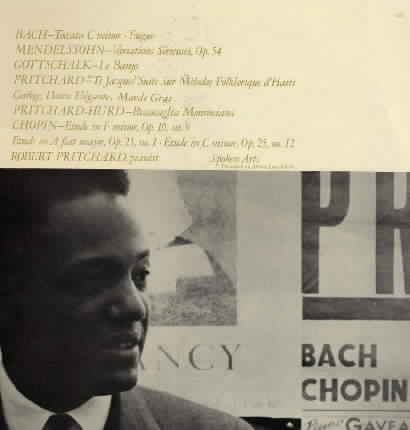 |
 |
 |
 |
 |
 |
 |
 |
 |
 |
 |
 |
 |
|
|
|
 |
 |
 |
 |
|
|
|
 |
 |
 |
|
|
| 1. BACH: Toccata in C minor |
| 2. BACH: Fugue |
| 3. MENDELSSOHN: Variations Serieuses, Op. 54 |
| 4. GOTTSCHALK: Le Banjo |
| 5. PRITCHARD: “Ti Jacques” Suite sure Melodie |
| Folklorique d`Haiti |
| (After a short story by Wilmer F. Lucas, Jr.) |
| 1. Cortege |
| 2. Danse Elegante |
| 3. Mardi Gras |
| 6. PRITCHARD-HURD: Passacaglia Monroviana |
| 7. CHOPIN: Etude in F Minor, Op. 10, No. 9 |
| 8. CHOPIN: Etude in A flat Major, Op. 25, No. 1 |
| 9. CHOPIN: Etude in C minor, Op. 25, No. 12 |
|
 |
|
 |
 |
 |
 |
|
 |
 |
 |
 |
 |
 |
|
|
|
 |
 |
 |
The occasion of a pre-centennial celebration of the Emancipation Proclamation (1863-1963) affords us in America a unique and special opportunity for a review of our historical and cultural mainsprings. It basically tells us a two-fold tale. Firstly what we have been through and secondly where we are. Yet sight unseen it gives us the opportunity for the enlargement and projection of our cultural pluralities. With this in mind I refer to Robert Pritchard as that face of the "New Negro," who because of his talents, acumen and intrepid energies is equally robust as an artist and as a man in projecting the living evidence of our total past, present and future. |
|
A Southerner by birth and tradition (Winston Salem, North Carolina) Dr. Pritchard's range of interests and competence reflects the goals of the Renaissance Man who is too often misunderstood in our times within the jack-of-all-trades context. Dr. Pritchard feels that all are raw materials, the essence of which he gives expression to in his Art. The obligations of daily living demand the same total involvement that he projects into the works recorded on this disc. In this respect his interpretations here will be considered by some no less controversial than his person. We have found Robert Pritchard to be incredulous and as a result difficult to document. Yet somehow his many faces become synthesized in his Art. |
|
In the words of a well known Paris critic "Robert Pritchard is very young and still very modest. His work seems like play to him, yet he is every inch a thorough professional. Smiling, amiable, he has not yet had time to assume the attitudes of a 'Prima Donna' . . . truly he is a very great artist ... he seems to radiate a kind of natural light that comes from his very soul." He was introduced to the piano by his father at a very early age. While still in secondary school he was accepted for private study at Syracuse University with pianist pedagogue Kirk Ridge. Indeed his entire education was secured through competitive scholarships, awards and competitions. Robert Pritchard's list of teachers reads like a page from Who's Who in the Music world. The late Carl Friedberg, Julliard School of Music, N. Y. C.; Robert Goldsand, Viennese-American Concert Pianist Pedagogue, Faculty Member Manhattan School of Music, N. Y. C.; Dr. Hans Neumann, Faculty Mannes School of Music, N. Y. C.; Arturo Benedetti Michelangeli, Italy; the late Edwin Fisher, and Eleanor Amzel. |
|
Robert Pritchard has toured Europe, Middle East and Africa and the Caribbean. Of his New York debut April 9th, 1961, The New York Times wrote, "He knew how to communicate a sense of musical presence ... a feeling for shape, line, phrasing and style. There was always a basic musicality, the authenitic and assured ring of real artistry." The New York Herald Tribune referred to his debut performance with the words, "Passion and intensity," the same which is characteristic of the performance on this disc. |
|
Seemingly the possessor of a many faceted career, Pritchard's many interests become unified in the act of creation. He was innovator of the Chamber Music series in a local New York Bistro (Five Spot Cafe) ; a faculty member in the center for African Studies, New School of Social Research, Founder of an Organization for the Study of Indigenous Cultures; a leader in cultural exchange between Africa and the United States. He was engaged by the Liberian Government as their first concert pianist in residence and University Music Department head. He has been active in cultural enterprises in Haiti and Senegal as well as in the United States. As a composer he is an ecclectic with more or less special interests in the creative utilization of African Afro derivative music. |
|
In the above as well as in his teaching he brings to his work not only high scholarship and disciplines from his background but a deep intuitive sense of understanding stemming from what he refers to as his Negritude. Robert Pritchard's entire life is dedicated toward bridging the gap between "differences" in people, nationalities and cultures. In this respect he is often considered an enigma among his own race. |
|
Though Robert Pritchard has been the piano teacher of some Jazz notables, in an attempt to extend technical horizons, his enigmatic position is well stated by a leading Negro Jazz figure in a recent issue of "Downbeat" magazine: "I know very few like Robert Pritchard. Robert Pritchard has his doctor's in music; he's black as Miles Davis. And this guy cannot swing. His whole life has been like this. There's no way on earth he can sit on the bandstand with a person like Bud Powell." Of his work in West Africa a leading African journalist, Joseph W. Taffe, wrote in the Daily Listener, Monrovia, Liberia: "In the comparatively short time in less than three months, American born concert pianist Robert Pritchard has accomplished more for cultural advancement and development of Liberia and of West Africa than many trade and economic Missions that have visited this country ..." |
|
As one of the most cogent disciples of the aesthetic principle of "La Negritude" Robert Pritchard has sewn the "BLACK THREADS OF ARIADNE" throughout the fibers not only of his compositions but as an added cultural condiment in his interpretations as a pianist. |
|
Finally this recording constitutes a landmark in the projection of the Negro as a concert instrumentalist and might well serve as an incentive for neophite (Negro) pianists who at this stage of the game could afford the lesson that this record teaches us. It is now up to us to weigh the promise of this type of artistry that has long been neglected here in the United States. |
WILMER F. LUCAS, JR. |
 |
|

